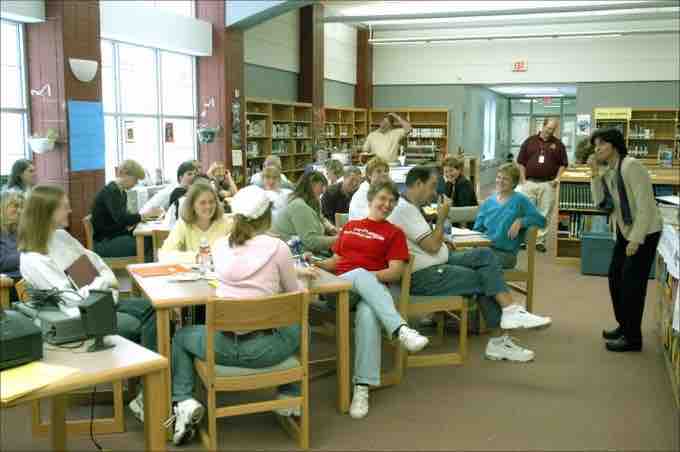Classroom Discussions
Classroom discussion isn't simply a way of gaining points; it's an essential part of learning, comprehending, and sharing knowledge. Class discussion is often used together with other forms of assessment to calculate your grade, even if there are no points expressly awarded. Together with lectures and individual study, discussing course readings and materials with your peers and the instructor can open up new insights that are impossible to achieve on your own. In order to get the most out of class discussion, the instructor and all students should engage in an actual conversation, not simply question-and-answer.

Classroom discussion
This class discussion is engaging.
As a learning method, classroom discussions are generally more fun and interactive than simply listening to a teacher lecture or doing written work. When presenting a question to a class of students, teachers open up the classroom discussion to different ideas, opinions, and questions, and can mediate while students come up with their own conclusions. Class discussions encourage learning through active participation, comprehension, and listening. They help students to think, solve problems, listen to others, and analyze the ideas of other students, all while backing up their own thoughts with evidence from past class teachings. Discussions also encourage the practice of informal oral communication, which is a much-needed skill later in life.
When participating in a class discussion, the following strategies are effective:
- Try to stay on topic. Outside references are often good for context, but remember that the focus here is on learning.
- Try to use relevant vocabulary from the lesson to confirm your understanding of new concepts and demonstrate your authority.
- Try to build upon the ideas of others; listen and respond as much as you speak.
- Always be respectful to others, especially if someone in the discussion offers an opinion that differs from your own.
- Try to provide constructive criticism to others regarding their thoughts, comments, or work: "I think you're on the right track here, but this point doesn't seem to be supported with direct evidence."
- Don't get too worked up if you disagree with the instructor or another student. A strong emotional response is good, since it indicates you're engaged with the topic, but always keep a calm demeanor to show your classmates your ability to work in this setting without getting angry or flustered.
Writing Workshops
A workshop is a special kind of classroom discussion in which students discuss each other's work. The advice given above on class discussions also applies when you and your peers are given time in class (or in a group study session, in the writing center, etc.) to workshop drafts of each other's papers. A writing workshop is an excellent way to get suggestions from peers that help you improve your paper, since fellow students may be able to offer a perspective your instructor cannot. Constructive, focused workshop critiquing also allows you to become a more critical reader and writer. Here are some questions that might be helpful for class discussions about student writing:
- What is the author saying in this text?
- Use three words to describe the tone and style the author uses in his/her argument. Is this the best tone and style to achieve the author's purpose?
- Where does the author present rhetoric that is based on emotion? On facts? Which of these seem to be most prevalent in the argument?
- Why does the author think this argument matters? Have they convinced you that it matters? How might the "so what" factor be raised?
- What special terminology does (or should) the author use?
- How does this text relate to other things that have been read in this class?
- Give the author two positive comments, and three suggestions for improvement in the next draft.